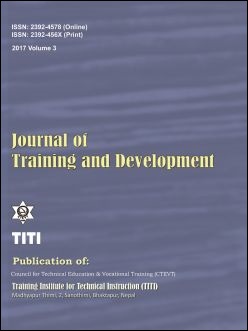Motivation of Persons with Disabilities towards Mainstream Vocational Training
DOI:
https://doi.org/10.3126/jtd.v3i0.18226Keywords:
Motivation, persons with disabilities, vocational training, NepalAbstract
The present study has explored the motivational factors to join the vocational training programs among persons with disabilities in Nepal. Based on the phenomenological approach, I conducted in-depth interviews with purposively selected eight persons with disabilities who had been undergoing short-term vocational training courses. I followed the thematic analysis technique to analyze the data. With the help of major content theories of motivation and the social role theory of gender differences, I discussed the study results. The participants’ expressions revealed that the motivating factors were employment, suitability of training to the type of impairment, utilization of free time, advice from relatives, opportunity to get training for free, personal interest, and a strong desire to do something. The results showed that both extrinsic and intrinsic factors were functioning as the motivators for the learners. Their perceptions supported the traditional gender-based selection of occupations. The study showed the need to adopt relevant measures to leverage the learners’ motivation for learning throughout the training.Downloads
Download data is not yet available.
Abstract
2616
PDF
2040
Downloads
Published
2017-09-27
How to Cite
Adhikari, E. R. (2017). Motivation of Persons with Disabilities towards Mainstream Vocational Training. Journal of Training and Development, 3, 12–21. https://doi.org/10.3126/jtd.v3i0.18226
Issue
Section
Articles
License
Authors who publish with this journal agree to the following terms:
- Authors retain copyright and grant the journal right of first publication with the work simultaneously licensed under a Creative Commons Attribution License that allows others to share the work with an acknowledgement of the work's authorship and initial publication in this journal.
- Authors are able to enter into separate, additional contractual arrangements for the non-exclusive distribution of the journal's published version of the work (e.g., post it to an institutional repository or publish it in a book), with an acknowledgement of its initial publication in this journal.
- Authors are permitted and encouraged to post their work online (e.g., in institutional repositories or on their website) prior to and during the submission process, as it can lead to productive exchanges, as well as earlier and greater citation of published work (See The Effect of Open Access).




